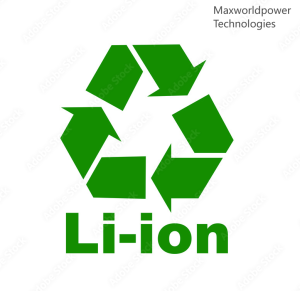Consider the old batteries you have no use for? A portion of our world is saved with each recycled one. Recycle your lithium-ion batteries right now to join the movement!
The disposal of spent batteries has long been an issue for both residential and commercial garbage. Despite significant advancements in battery technology, chemicals deemed dangerous may still be present in even the most sophisticated rechargeable lithium-ion batteries.
Pollution of the environment is not the only issue. Any modern electronic gadget that is nearing its end of its useful life should be handled, stored, and disposed of carefully to reduce the chance of fire or poisoning.
There is still a significant issue ahead of us, which is the actual “battery crisis.” Furthermore, we’re not limited to discussing Li-Ion phone power banks.
The main difficulty will be how to dispose of the massive amounts of batteries that come from electric vehicles; with today’s recycling technology, we should be able to handle this task.
Thankfully, recycling lithium-ion batteries is beginning to gain traction. Here is what you can contribute.
Are Lithium-Ion Batteries Recyclable?

Lithium-ion batteries can be recycled, although the procedure is a little difficult. This could be the cause of your inability to locate recycling facilities in your area that are capable of handling them.
The inability to recycle lithium batteries like regular electrical garbage presents the first obstacle.
The element lithium is very reactive.
In short, it’s not a good idea to combine ordinary paper recycling with a lithium battery. If they are damaged or handled incorrectly, they may get heated or ignite a fire. While not frequent, these instances are increasing in frequency as these batteries become more widely used.
EV lithium-ion battery
Lithium-ion battery recycling must be done correctly to ensure public safety and environmental preservation. Because of their particular risks, these batteries can’t just be reused; instead, they need to go through a specific recycling process.
Recycling lithium batteries also lessens the need to extract new minerals, which is always good for the environment.
Can lithium batteries be recycled to a 100% degree has been a topic of discussion.
Most of the materials found in a lithium battery can be recycled, however not all of them are. In an effort to raise this percentage, recycling techniques are becoming more effective and technology is progressing. Furthermore, be aware that lithium battery recycling is not an endless process. Lithium-ion battery recovery materials, similar to metals, have several recycling cycles. But the material’s purity could be diminished with each cycle. Scientists are attempting to create an infinite recycling cycle.
You should also be aware that lithium batteries should never be thrown in the trash.
Because they might be hazardous if damaged, lithium batteries require specific management. Because they may ignite or leak dangerous chemicals if improperly processed, they cannot be handled like ordinary recyclables.
How Can Lithium-Ion Batteries Be Recycled?
Lithium-ion battery recycling is crucial for resource conservation and environmental protection. Here’s a how-to tutorial for doing things correctly:
Locate a Recycling Facility
Try utilizing Green Directory to locate reputable lithium battery recycling facilities in your area. Dead or damaged batteries can be recycled by the accredited personnel at our recycling centers, which are equipped with the proper machinery.
Do Give it a Try, Please
There are battery recycling containers available at several electronics stores and retailers, where you may dispose of used batteries for free.
Get Ready for Reuse
Battery handling: To avoid short circuiting, which could result in a fire, tape the battery terminals or put each battery in its own plastic bag.
Move Safely
Batteries should be transported at a comfortable temperature and kept away from any combustible materials when being recycled.
Recognize the Disassembly Process: Skilled recyclers break down batteries into their individual pieces. Shredded material is used to separate the various materials in this process.
Material Separation:
Next, several techniques such as hydrometallurgy, pyrometallurgy, or mechanical separation are used to separate the metals and other materials.
Recovery and Repurposing:
Recovered materials, like nickel, lithium, and cobalt, can be utilized in other applications or to create new batteries.
Safety in the Environment
Observe the Rules:
When recycling batteries, make sure you always follow your local environmental rules for compliance and safety.
Encourage safe behaviours:
By providing resources and information, you may encourage people to recycle their batteries.
Corporate Accountability
Certain manufacturers run their own return policies. Verify whether the manufacturer of your gadget has a battery recycling programme.
Keep Up with Battery Types:
Note that not all methods of recycling lithium batteries are the same. Lithium-ion and lithium-primary batteries, for instance, undergo distinct recycling procedures.
Technological Updates:
Technology for recycling is always evolving. In order to recycle your batteries as effectively as possible, keep up with any new recycling techniques.
By following these steps, you can ensure that your lithium-ion batteries are recycled safely and responsibly, contributing to a healthier planet and the conservation of valuable resources.

